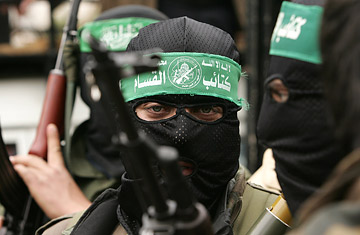Poll: Majority of Palestinians Support Payments to Terrorists

Ninety-one percent of Palestinians are opposed to the suspension of Palestinian Authority (PA) payments to prisoners, including terrorists, being held in Israeli jails, according to a recent poll by the Ramallah-based Palestinian Center for Policy and Survey Research (PSR).
PSR conducted the poll in the West Bank and the Gaza Strip between June 29 and July 1, 2017, with a sample size of 1200.
PSR highlighted other important findings, including that strong majorities of Palestinians are opposed to the PA’s decisions to cut employee salaries in the Gaza Strip (88 percent) and to stop covering Israeli-supplied electricity to Gaza (84 percent). Gaza is ruled by Hamas, a U.S.-designated terror group and rival to Fatah, which dominates the PA.
According to PSR, many Palestinians who were surveyed viewed “these measures as aiming at imposing economic hardships on the population in order to force it to reject Hamas’ rule. Very few people think that the PA has taken these measures due to the financial problems [that] it currently faces.”
PSR’s recent poll also noted that 69 percent of Palestinians believed that a recent hunger strike by Marwan Barghouti “enhanced his leadership status.” As CAMERA highlighted in an Algemeiner Op-Ed, Barghouti is a convicted terrorist and murderer who is incarcerated in an Israeli prison. Barghouti used his prisoner status to launch a “hunger strike” in order to gain political popularity and influence—although many in the media omitted this reason behind Barghouti’s political machinations, choosing instead to portray him as a “freedom fighter” protesting supposed indignations he claims to have suffered in incarceration.
Barghouti’s ploy seems to have worked; the survey noted that if presidential elections were held today between PA President Mahmoud Abbas, Hamas leader Ismail Haniyeh and Barghouti, the latter would be the most popular candidate.
Poll results also reflected strong dissatisfaction within Palestinian society: Only eight percent of Gazan Arabs and twenty-four percent of West Bank Palestinians voiced a “positive evaluation of conditions” in their respective societies. An astonishing 79 percent of Palestinians in the West Bank said that PA institutions were corrupt and 58 percent said that people “cannot criticize the PA without fear.” Indeed, PSR highlighted that the polls showed that “the most serious problem confronting Palestinian society today is the spread of corruption in public institutions.”
Nonetheless, as CAMERA has pointed out in a recent Times of Israel Op-Ed, “When The Washington Post Makes Palestinians Disappear,” many media outlets routinely ignore internal Palestinian affairs and developments; only reporting on them when links to Israel can be made, or even conjured.
PSR’s poll can be found here.
More from SNAPSHOTS
CNN’s Amanpour Condemns “power grab” By Israel’s Prime Minister and Others
April 1, 2020
We’ve said it often, but it’s worth repeating: Anyone interested in reasonably unbiased information about Israel (at least) should avoid the broadcasts of CNN’s Chief International Correspondent and Anchor, Christiane Amanpour. In characterizing responses to [...]
Seattle Media Oblivious To Imam’s Hateful Indoctrination Condemning Jews
January 7, 2020
The Masjid Ar-Rahmah mosque teaching – that Allah transformed Jews into apes and pigs for disobeying him – delivered by Imam (prayer leader) Mohamad Joban – was posted online by mosque personnel. This December 2019 [...]
AP Distorts: Bethlehem ‘Almost Completely Surrounded’
December 10, 2019
Over two years after improving inaccurate language falsely citing Israel's security "barrier surrounding the biblical city" of Bethlehem, the Associated Press once again misrepresents. AP's Joseph Krauss and Mohammad Daraghmeh wrote yesterday ("Palestinians in Bethlehem [...]
Reuters Errs on Administrative Detention For ‘Anti-Israel Activity’
November 5, 2019
The Ofer Prison, near Ramallah (Photo by Tamar Sternthal) A Reuters article today egregiously misrepresents administrative detention, erroneously asserting that it is mainly applied to "Palestinians suspected of anti-Israeli activities," when in fact the Israeli [...]


